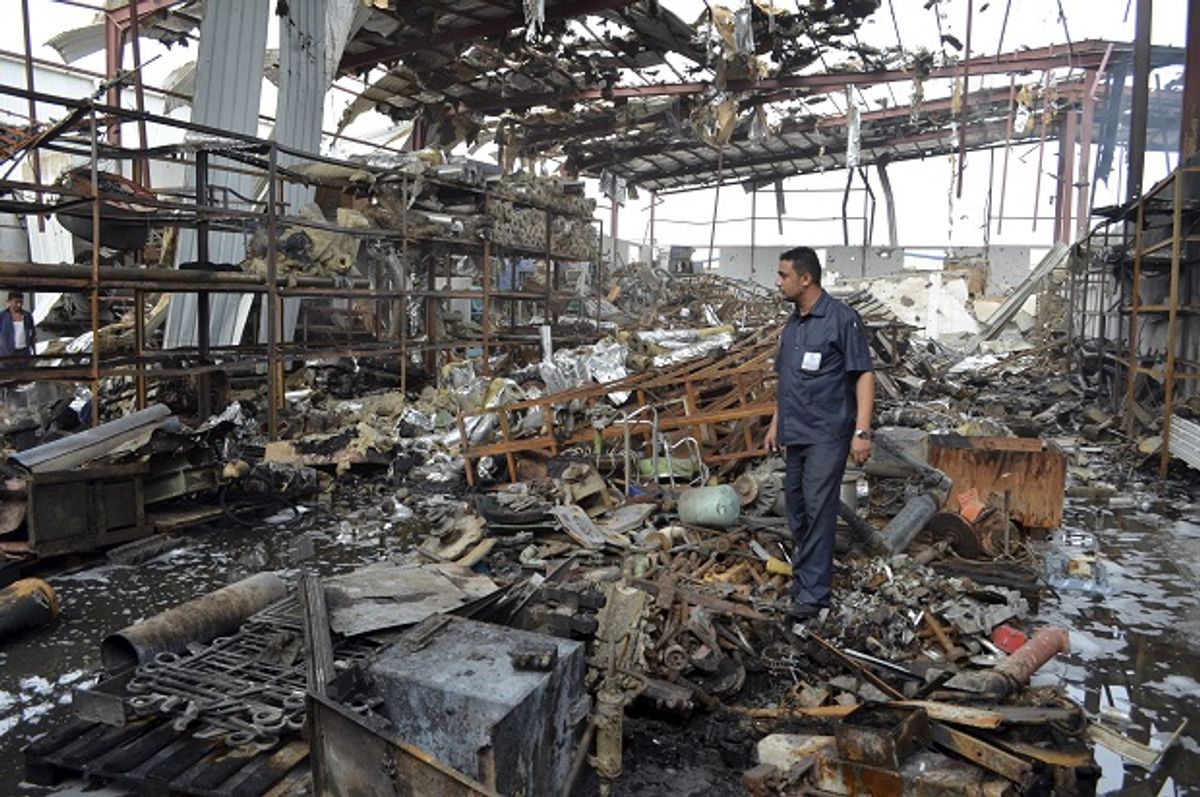Three medical facilities run by Doctors Without Borders have been bombed in the past three months in the Saudi-led war in Yemen, while human rights organizations have accused the U.S.-backed coalition of war crimes for targeting civilian areas.
A hospital supported by Doctors Without Borders -- which is known internationally as Médecins Sans Frontières, MSF — in northern Yemen was bombed Sunday, killing at least five people and wounding nine more. Several buildings were also destroyed in the attack.
The international humanitarian organization said it could not officially confirm the origin of the attack, but Saudi-led coalition planes were seen flying over the hospital at the time of the bombing, and rebel groups do not have planes, leaving little doubt that the U.S.-backed coalition is responsible.
The details of the attack are quite similar to those of previous coalition bombings of Yemeni hospitals. As was the case in the former attacks, MSF made it clear that it provided GPS coordinates of its medical facility.
"All warring parties, including the Saudi-led coalition, are regularly informed of the GPS coordinates of the medical sites where MSF works and we are in constant dialogue with them," explained Raquel Ayora, MSF director of operations.
"There is no way that anyone with the capacity to carry out an airstrike or launch a rocket would not have known that the Shiara Hospital was a functioning health facility providing critical services and supported by MSF," she added.
Scores of other Yemeni hospitals have also been shelled by Saudi-led forces, and Shiara Hospital had in fact already been bombed at least once before MSF started supporting it. MSF stressed in a statement that attacking hospitals is a violation of international humanitarian law and constitutes a war crime.
In October, the U.S.-backed coalition bombed an MSF hospital in Yemen, in an attack the U.N. condemned. Several people were injured, and the building was razed to the ground.
This attack came just weeks after the U.S. bombed an MSF hospital in Kunduz, Afghanistan, killing at least 30 people, including 14 staff members. MSF called the attack a "war crime," and the U.S. refused to allow an independent investigation into the incident.
In December, the Saudi-led coalition bombed another MSF medical facility in Yemen's southern city of Ta'iz, which had treated 480 patients in the two days before the attack. At least nine people were injured in the bombing.
The death toll in this weekend's attack is still rising, as people who were trapped in the rubble are uncovered and survivors succumb to their wounds. Four deaths were announced on Sunday, and a fifth victim died Monday morning.
All of the surviving staff and patients evacuated were transferred to another hospital supported by MSF in Saada, Yemen.
"We strongly condemn this incident that confirms a worrying pattern of attacks on essential medical services and express our strongest outrage as this will leave a very fragile population without health care for weeks," said Ayora. "Once more it is civilians who bear the brunt of this war."
The third hospital bombing comes amid a series of attacks committed by the U.S.-backed coalition that human rights organizations have characterized as war crimes. Saudi-led forces have bombed hospitals, weddings, refugee camps, civilian neighborhoods, government buildings, centers for the blind, humanitarian aid warehouses and more in the ongoing war.
On Jan. 5, the Western-backed coalition bombed a center for the blind, Yemen's chamber of commerce and a wedding hall in capital city Sanaa.
The next day, the Saudi-led coalition dropped widely banned U.S.-made cluster bombs on civilian neighborhoods in Sanaa. Human Rights Watch called the attack "outrageous" and said it was a war crime. Cluster munitions are banned in 118 countries — although the U.S. and Saudi Arabia refuse to sign the Convention on Cluster Munitions, the 2008 international treaty that bans the indiscriminate weapon. The cluster bombs the coalition dropped on Yemeni civilians were made at a U.S. army ammunition plant in Tennessee.
The U.S. media has been very quiet about the ongoing war on Yemen, and its coverage has often been euphemistic and misleading. Reports frequently characterize the war as "sectarian" and claim the Houthis are a proxy of Iran. Award-winning investigative reporter Gareth Porter has challenged these allegations, however, arguing there is little evidence for them. Porter says "false stories of Iran armed the Houthis were used to justify war in Yemen."
The conflict broke out in Yemen, the poorest country in the Middle East, in late March. For almost 10 months, a coalition of Middle Eastern nations and militants loyal to President Abd Rabbuh Mansur Hadi, led by Saudi Arabia and armed by the U.S. and U.K., has been fighting Houthi rebels and militants loyal to former President Ali Abdullah Saleh.
Approximately 2,800 civilians have been killed in Yemen since the start of the war, according to the U.N. Another 5,300 have been wounded.
The U.N. has reported that the Saudi-led coalition is responsible for approximately two-thirds of civilian deaths.




Shares